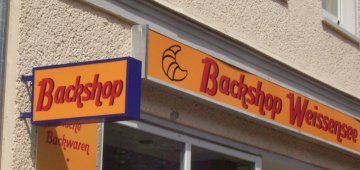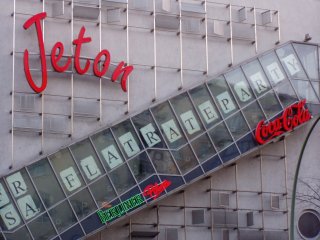|
> > >
Word of the Day
An regular (but not necessarily daily) series explaining some everyday German words
which you might not find in your dictionary.
Wednesday, June 27, 2007
Today - June 27th - is an important day in Germany if you want to know what the summer's going to be like. At least according to agricultural tradition, which holds that the weather on June 27th - Siebenschläfertag - will determine the general meteorological trend for July and August.
There are several rhymes of weather lore to go along with Siebenschläfertag, such as:
- Das Wetter am Siebenschläfertag sieben Wochen bleiben mag
- Wie's Wetter am Siebenschläfertag, so der Juli werden mag
- Wenn die Siebenschläfer Regen kochen, dann regnet’s ganze sieben Wochen
Thursday, May 10, 2007
Unable to display image with ID
Ersatzverkehr
If you're using public transport, Schienenersatzverkehr - often written as SEV for short,
or as you can see from the photo, shortened to Ersatzverkehr - is not
a word you want to see or hear too often. It literally means "track replacement traffic", i.e. replacement
buses running instead of the normal S-Bahn, U-Bahn
or Tram services.
Tuesday, May 8, 2007

A Backshop is not somewhere you could buy, say, a back-scratcher. You will
however find a large range of bread and pastries, for "Back" derives from
"Backwaren", aka "bakery products". And as "shop" is a direct
equivalent of der Laden, it's "der Backshop".
This word has become common in Berlin since the late 1990's; I'm not sure why, or
what advantage it has over the more prosaic Bäckerei.
Monday, April 30, 2007
'twas the night before May Day, when all through the inner city
not a street was silent, not even a house The Molotov cocktails were prepared with care
In hopes that the police would soon be there
(With apologies to Clement Clarke Moore.)
Yes, Walpurgisnacht - Walpurgis Night, April 30th, is upon us
once more. It's a festival is named after Saint Walburga, apparently a
niece of Saint Boniface if you really must know, and whatever the
precise historical details, in parts of Central and Northern Europe
it's a jolly good opportunity for a bit of a knees-up to celebrate the
arrival of Spring. And maybe light some whopping great fires.
Thursday, March 29, 2007
Came across this new denglish creation in this week's Stern magazine. (At least I think it's denglish;
a quick search brings up mainly German sites). Anyway, although it
sounds like an accident which might happen on an oil drilling platform,
it's actually a play on the word "burnout", used to describe the
phenomenon of burnout through boredom. You see, it seems there are lots
of people working in offices who are actually chronically unbusy and
suffer from the terrible problem of having to find ways to kill their
time at work, usually with the help of Youtube. (As a
self-employed person that made me go all jealous, until I remembered
that - whenever I have a free moment - I can wander out at will to e.g.
enjoy the lovely weather. If I can drag myself away from this fascinating Youtube video, that is).
Tuesday, March 27, 2007

It might sound like a gathering of DSL users, but a Flatrateparty (Flatrate-Party, Flat-Rate-Party) is actually an event where you'll find a large number of comatose teenagers, attracted by the all-you-can-drink offer (as a native English speaker might say). "Flatrate"
first made its appearance in the language of Goethe during the late
1990s with the rise of DSL, which is usually coupled with a flat-rate
charge (although some ultra-cheap services may offer volume or
time-based tarifs). Flatratepartys
(sic) are a more recent phenomonen, and during the past few weeks have
been making the headlines due to repeated incidents involving teenagers
literally drinking themselves into comas.
Saturday, March 10, 2007
Ever turned up at a bank or department store (typically early in the
morning) and found the doors unexpectedly closed and adorned with a
cryptic notice about a " Betriebsversammlung"? The dictionary
will tell you it's a "company meeting", but companys have meetings all
the time without having to close to the public, don't they? Well, a
Betriebsversammlun g is actually a legally-required meeting to
inform employees about the situation in their company, and so no-one
has to get up early or go home late, they're usually held during normal
company hours, and include everyone. So doors closed.
Thursday, March 8, 2007
March 8th is Frauentag, or more precisely "Internationaler
Frauentag" (International Women's Day). It's not an official event, but
there's usually a few political happenings throughout the city as well
as the usual platitudes from the politicos. The SPD will be handing out
roses in various locations throughout Berlin (e.g. 5pm at the Schönhauser Allee Arcaden under the slogan " Frauen verdienen mehr" (" Women deserve / earn more").
Friday, March 2, 2007
Actually two words, and they're celebrating 100 days in office today: " Rot-Rot" ( red-red) refers to Berlin's governing coalition, made up of two parties who both use red as their identifying colour. That's the SPD ( Sozialdemokratische Partei Deutschlands, Germany's main social democratic / left-of-centre party), and the Linkspartei
(Party of the Left, which is an uneasy alliance between the former PDS
- the successor to East Germany's communist party - and left-wing
elements of the SPD who were unsatisfied with their party's
increasingly centrist leanings in recent years).
Thursday, March 1, 2007
You'll meet this word a lot when using public transport: Kurzstrecke
literally means "short stretch" or "short distance" and is used to
indicate a special fare for especially short journey. In Berlin a Kurzstrecke-ticket ( Kurzstreckenfahrschein)
for the public transport system is available at about half the price of
the standard 2-hour ticket, but only entitles you to travel three stops
by U-Bahn or S-Bahn, or
six stops by bus or tram (here with no changing allowed). Taxis also have a Kurzstreckentarif - a €3.50 flat fare for trips of up to 2km (but only if you flag the taxi down on the street, not from a taxi rank).
|


